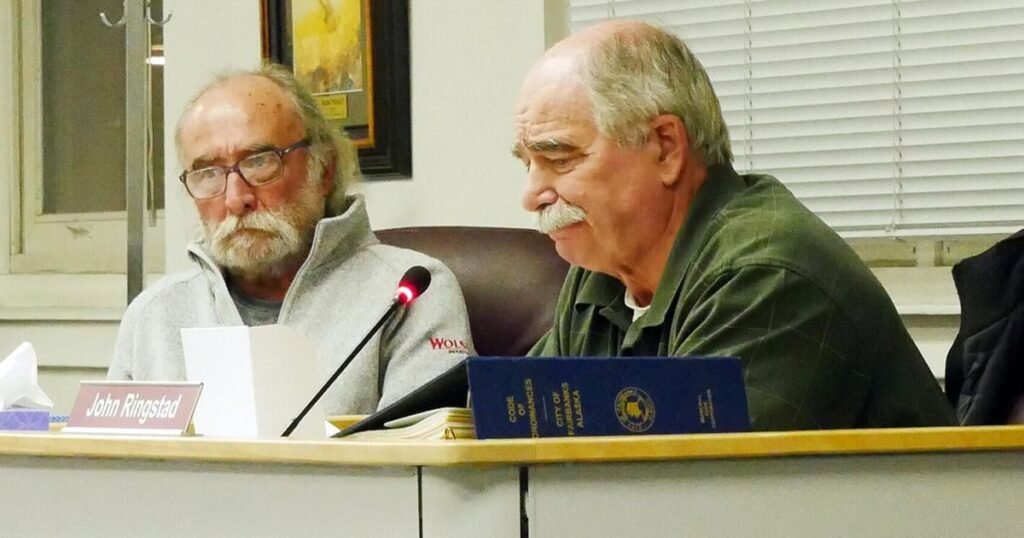A pair of property-related ordinances go before the Fairbanks City Council on Monday after being postponed for a month.
One ordinance proposes placing vacant properties on a city registry for more than 180 days. A second would offer a tax incentive or rebate for property owners who do a minimum value of renovation or rehabilitation on older homes and buildings.
Both ordinances were delayed after council members had concerns and questions. The City Council adopted a third ordinance in June that expanded how the city can address blighted or problem properties
Councilmember Sue Sprinkle, one of the local legislation’s primary sponsors, made some substantial additions to both ordinances to make it more palatable.
The council discussed the changes during a Tuesday morning work session.
Ordinance 6283 would require property owners to register residential and commercial buildings that are vacant for longer than 190 days with the city of Fairbanks. Properties would need to be secured to prevent entrance.
Seasonal use, vacation rentals and properties up for sale would be exempt from the requirement.
Sprinkle’s changes eliminate a $100 inaugural registration fee, but keep a $250 fee for being on the register for a second year and $500 for all subsequent years. Another change allows owners to optionally grant Fairbanks police officers authority to enter a vacant building and remove unauthorized people on the owner’s behalf.
Councilmembers Jerry Cleworth and Lonny Marney said the registry and the option to allow police officers to enter vacant properties could address a lot of concerns.
“This would be great for the snowbirds that every neighborhood has,” Marney said. “They can get a property registered just in case someone broke in and police would be able to access the house.”
Mayor David Pruhs, one of the ordinance sponsors, said it reinforces public safety and damage prevention. He cited two fires that damaged vacant residential buildings in the past few weeks as an example.
“Sadly, it appears you are getting some extreme vandalism in vacant properties,” Pruhs said.
The ordinance stipulates the registry would be confidential and wouldn’t be published. However, City Attorney Tom Chard clarified the list would still be available through a public information request, even if the city doesn’t intend to broadcast it.
“The registry would be a public record,” Chard said. “If we were to get a public record request, we would have to release that record under state law.”
Ordinance 6285 incentivizes property owners to renovate or redevelop their older housing stock with a minimum $50,000 of investment. Sprinkle’s amendments change the incentive from a property tax freeze on the renovation value to giving owners a rebate.
Chief of Staff Michael Sanders, who helped shape the ordinance, said the rebate was the overall intention, rather than a freeze on a property’s tax rates.
The original ordinance would have frozen a property’s assessed value for two to five years, depending on the value of the renovations. After the period elapsed, the renovations would be counted as new construction on the city’s property tax rolls.
“By being a rebate, we are not lowering our tax rolls,” Sanders said. “The property tax revenue will come into our general fund, and after that, we will issue a rebate back but our tax rolls will continue to grow during the process.”
Sanders said if the incentive is categorized as a deferral, the city’s tax base wouldn’t grow as a result of the improvements. The city’s tax revenue cap folds new construction into its formula when calculating tax levies for the next budget cycle.
Cleworth retained some concerns he previously raised, including impacts on the city’s budget. A fiscal note estimates that a rebate for $50,000 in work totaled $295.70, while $1 million worth of renovations would generate a $5,914 rebate.
Over five years, each rebate for $50,000 worth of work cost the city $1,478. A rebate on $1 million renovation would cost the city $29,570 in that same period.
“It might be wise to wait on this until after we look at the budget and see where we stand,” Cleworth said. “The outlook from the finance committee that we received a month ago is concerning.”
In July, the city’s finance committee provided a long-term projection showing the city could spend more than it took in without either re-evaluating its expenses, and streams of revenue or relying more and more on the city’s permanent fund.
A secondary concern was alleviated when City Attorney Tom Chard said the incentives are non-transferable if a property is sold to a new owner.
Councilmember June Rogers said she was concerned with both ordinances, citing mixed results in responding to past property concerns and complaints.
“If we are going to talk about a blanket discussion of all the buildings in our area, we need to look at our responses to some of the things that have been there,” Rogers said. “We have a certain number of categorized buildings but I see many others that aren’t listed and I wonder at the inequities involved.”
She said the city appears to be rushing into tackling property abatement and incentives rather than taking its time.
“I’m not sure we’ve had all the discussions that are necessary,” Rogers said.
Marney said the changes to the incentives ordinance move the legislation in the right direction.
“If we take our time and include all the people involved as far as those who flip homes, remodel homes, or build duplexes and all that in the discussion … it will benefit the city in the long term,” Marney said.
The Fairbanks City Council will consider both ordinances at its meeting on Monday. The council meets at 6:30 p.m. at Fairbanks City Hall, 800 Cushman St.

